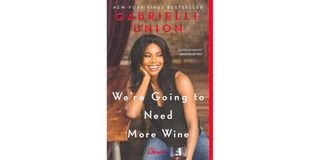Trauma after rape; the case for Gabrielle Union

The cover of Gabrielle Union's memoir.
What you need to know:
- Gabrielle is a relentless champion of better treatment for rape victims, and prosecution and apprehension of perpetrators.
- Most rape victims, especially black women, are treated deplorably in the US, during health attendance and the process of drawing evidence to create rape kits.
Hollywood superstar Gabrielle Union's integral memoir, We Are Going to Need More Wine, explores the rape culture and ponders the situation in the city of Pleasanton, an exceedingly hospitable locale in California.
It's a half an hour drive from the vibrant Oakland and 51 minutes from the mountainous and liberal San Francisco. Pleasanton is predominantly inhabited by a white population and astronomically ranked the third wealthiest city in the United States.
Gabrielle schooled in Livermore High, where she was an ‘A’ student and a point guard for her high school basketball team. She had a short collegiate stint in the University of Nebraska, before her acceptance at the famous University of California in Los Angeles (UCLA) to study sociology.
In 1992, after her first year as a 19-year-old, she got a part-time job in a Pleasanton branch of Payless Shoe Store.
On one regrettable occasion, country musician Garth Brooks was performing in Pleasanton. Gabrielle's friends requested her and another female employee to cover for them at Payless, while they attended the concert. Unbeknown to Gabrielle, a former male employee of Payless had been breaking into a branch of a Payless store within the city.
The criminal walked into Gabrielle's store, just before closing hours. He emptied the cash register and motioned to Gabrielle and her colleague to walk to the rear of the store, at gunpoint. He instructed her to remove her clothes and during the rape ordeal, he weirdly asked her to hand him the gun he had placed on the floor.
Gabrielle grabbed it and amid sobs and rage, directed the barrel at him in quick succession, pulled the trigger but missed her target. They struggled for the gun as she screamed. He bashed her across the face. She expected him to decapitate her, but, fortunately, he ran out through the back exit.
Most rape victims, especially black women, are treated deplorably in the US, during health attendance and the process of drawing evidence to create rape kits.
However, Pleasanton had an underutilised rape crisis centre, with proficiently trained doctors, nurses and other medical personnel that hospitably helped Gabrielle. The rapist was later arrested and charged in court. He took a plea deal and was sentenced to 30 years in prison.
After Gabrielle was raped, she rarely left her house for a year, unless she had to attend court or therapy. She subconsciously timed everything. She believed if she could limit the time she spent in a facility, it would narrow the likelihood of being murdered, if the establishment was attacked by a robber.
Her mind was controlled by trepidation. When studying in the library, and she lost track of time, she'd sprint to her car, jump in and slam the door. She'd slump into the driver’s seat in a heap of tears. She'd shiver and shake in agitation and her arms would numb as though she was experiencing a heart attack.
Her car was manually operated and she couldn’t stop her foot from shaking to place the car in gear. So she had to sit still. This meant a car-jacking was imminent. She moved from the terror of one random act of violence, to a thought of mythic horror.
When she returned to UCLA, she began group therapy. It was the only place she felt sane. She was under the confines of other young people bearing the same anxiety, post-traumatic stress disorder (PTSD), panic attacks and tribulations.
Also read: Stop rape, that grave violation of women
She states that when you’ve been raped, you feel as though you’re on an island. Rape is the most under-reported crime. It’s shrouded in secrecy, trauma and shame.
Over 95 per cent of victims are raped by someone who's familiar to them—a father, uncle, acquaintance, colleague, teacher, preacher or doctor. Weirdly, Gabrielle felt relieved that her rapist was a stranger. There was no grey area on who would be believed—the victim or the perpetrator.
She was also the only one in the group therapy who had victoriously endured the criminal justice system and impelled her attacker to be convicted. Some of the women in her therapy sessions still had classes with their rapists.
One engineering student, who was raped by her lab partner, had to drop out. She felt trapped and mentally tortured, having to encounter her rapist daily.
One offensive question Gabrielle says she is often asked is what she was wearing during the rape incident. An affirmation of society's outrageous determination to victimise the victim by blaming their outfit for the rapist's sacrilegious capital offence. Trivialising the magnitude of the felony, in the process.
Gabrielle is a relentless champion of better treatment for rape victims, and prosecution and apprehension of perpetrators. “I decided to use my celebrity to talk about what rape does to your soul, your psyche and your sanity," she writes.
Jeff Anthony is a novelist, a Big Brother Africa 2 Kenyan representative and founder of Jeff's Fitness Centre @jeffbigbrother





